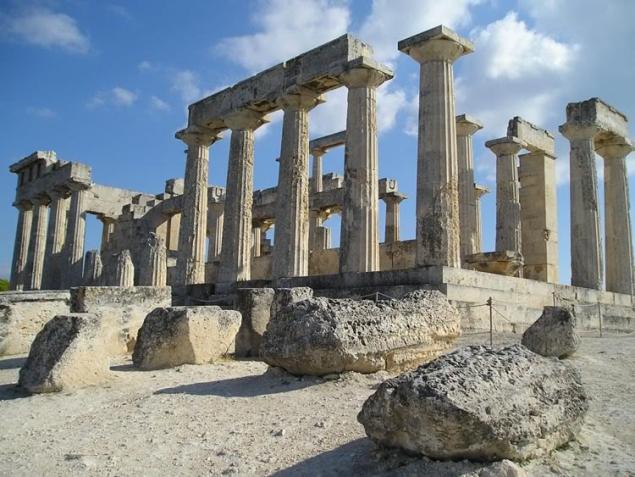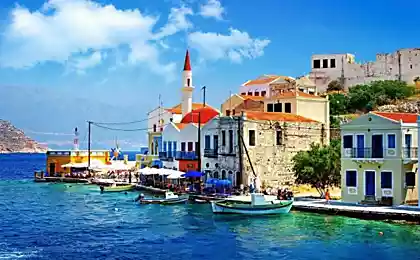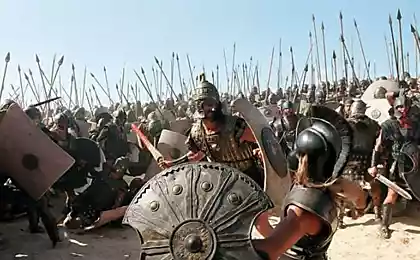1229
Interesting facts about Greece

With an area of 50,949 square miles (131,958 square kilometers) Greece is approximately equal in size to the US state of Alabama. The population of Greece is more than 10 million people - for comparison - in Alabama is home to around 4, 5 million people.
About 16, 5 million tourists visit Greece every year, it's more than the entire population of the country. Tourism accounts for about 16% of gross domestic product (GDP) of Greece.
In Greece, no one can renounce the right choice. Voting is compulsory for all citizens over 18 years old.
About 7% of the marble produced in the world is produced in Greece.
In Greece, there is a large international airports, than in most countries, as it wants to visit a lot of foreign tourists.
Third country for the production of olives, Greece, growing olive trees in ancient times. Some olive trees planted in the thirteenth century, is still bearing fruit.
According to Greek mythology, Athena and Poseidon argued that the one who will hand over the city the best gift would be his patron. Although the gift of Poseidon was the water, olive tree, a gift from Athena, it was seen by other gods as a more valuable gift.
In Greece, there is no navigable river because of its mountainous terrain. About 80% of Greece is covered with mountains.
An old Greek legend has it that when God created the world, he sifted all the way to the ground through a sieve. When each country has received good soil, he threw stones remaining in the sieve over his shoulder and created Greece.
Approximately 98% of the population of Greece - Greeks. Turks make up the most significant minority. Among the representatives of other nations live in Greece, Albanians, Macedonians, Bulgarians, Armenians and gypsies.
Approximately 12 million people worldwide speak Greek. They live mainly in Greece, Cyprus, Albania, Turkey, USA.
Thousands of Russian word comes from the Greek, Roman times through adaptation in Latin and then in Russian. Common words with Greek origin, this word "academy", "Marathon", "siren", "alphabet" and "typhoon».
In 1950, only about 30% of adult Greeks could read and write. Today, the literacy rate is over 95%.
Greece has more than 2,000 islands, about 170 of which are inhabited. The largest Greek island - Crete (3189 sq. Miles) (8260 sq. Km.).
Over 40% of the population live in Athens, capital of Greece. Ever since the city became the capital of the modern state, its population has grown from 10 000 in 1834 to 3, 6 million in 2001.
Continuously inhabited for 7,000 years, Athens - one of the oldest cities in Europe. It is also the birthplace of democracy. Western philosophy, the Olympic Games, political science, Western literature and historiography, the most important mathematical laws and the Western theory of tragedies and comedies.
Some scientists say that the Greek civilization there for so long, I had the opportunity to try on myself almost every form of government.
In Greece, there is more than 250 days of sunshine - or 3000 hours of sunshine - a year.
Currently, the male population of Greece is obliged to serve in any army troops from a year to 18 months. The state spends 6% of its annual gross domestic product (GDP) on the military.
Ancient Greece was not a unified state, as a modern Greece. Rather, it was about 1,500 individual city-states or policies. Each had its own laws and the army, and they are often in conflict. Athens was the largest city-state.
By the end of the 1990s, Greece has been the main enemy of Turkey, since these states had historical disputes over Cyprus and other territories for decades. Once rendered mutual assistance in the devastating effects of the earthquake that hit the two countries in 1999, their relationship has improved.
The average life expectancy of ancient Greek women was 36 years and for men 45. Of all children born half dying in infancy. At present, life expectancy in Greece is among women - 82 years for men - 77 years. Greece is on the 26 place in the world for life expectancy.
Greece - a leading manufacturer of marine sponges.
Greek ships account for 70% of merchant vessels of the European Union. According to Greek law 75% of the ship's crew should be Greeks.
In Greece, there is a large archaeological museums than any other country in the world.
Nursing homes - a rarity in Greece. Grandparents typically live with their families their children to death. Most young people live with their parents until they enter into marriage.
Feta produced from goat's milk is a traditional Greek cheese. It was already known in the Homeric era and its annual consumption per person is the highest in the world.
In Greece, people are more willing to celebrate the name day, the days of the saints, whose name they wear, what their own birthdays.
Thousands of birds stop at the wetlands of Greece during the flight. His winter is carried out as many as 100,000 birds from northern Europe and Asia.
The expression "to take the bull by the horns' comes from the Greek myth of Hercules in which he saves from Crete enraged bull, grabbing him by the horns.























